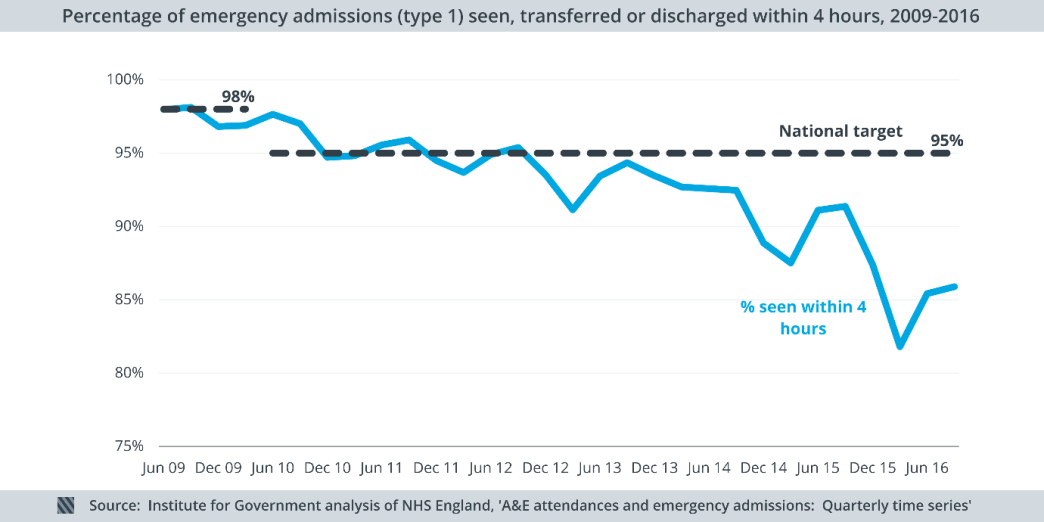The Government is continuing to bounce from crisis to crisis on health and social care. With the Budget less than a month away, the Chancellor must resist the temptation to simply dump more money into the NHS, argues Emily Andrews.
In what seems like an endless cycle – crisis, cash, repeat – the Government is once again facing heavy criticism for its approach to health and social care. Yet, despite the Secretary of State for Health’s own admission that the NHS is under ‘extraordinary pressure’, we see no signs that the Government is developing a new approach to tackle the sector’s mounting challenges.
While a week of sustained press coverage and leaked A&E waiting times figures may have garnered headlines – enough to prompt a response from Jeremy Hunt – those figures will not have been a surprise to him or to anyone who has been paying attention to the data for the last few years.
NHS performance is in sharp decline.
The Government’s A&E waiting time target (that 95% of people will be seen within four hours) has not been met since 2012, and performance has been declining ever since.

It’s not just A&E where government targets are being missed: more people are waiting longer for treatment after non-urgent referrals, or for their cancelled operations to be rescheduled. In Q3 2016/17 (up to December last year), 6,450 people were waiting longer than 62 days for their first cancer treatment (three percentage points above the government target).
The NHS is not the only public service in this crisis cycle.
As we have seen time and again, the Government waited for public outcry to reach critical mass before responding to problems in public services which had been clearly evident for a long time.
After three years of rising violence (assaults on prison staff have increased by 60% since 2014), last November’s Autumn Statement included a cash boost for 2,500 new prison officers, effectively reversing two years of staff cuts and returning staffing to 2014 levels. In some institutions, staff are sorely needed, as the disturbing footage from this week’s Panorama shows.
When the Chancellor faced widespread criticism for his silence on social care in that same Autumn Statement, Sajid Javid, the Secretary of State for Communities and Local Government, announced that local authorities would be allowed to bring forward council tax increases to plug their social care funding gaps. This sticking-plaster solution has entirely failed to hold concerns about social care at bay – as last week’s furore over Surry County Council’s proposed referendum rather embarrassingly demonstrated.
At the same time, the long-term issues facing the sector – ever-growing demand, providers under pressure, and rocketing delayed transfers from hospital (up 40% since 2014) – are still intensifying.
The same thing cannot happen to the NHS on 8 March.
The Chancellor is likely feeling the pressure to take a similar approach to health, and inject cash into the NHS to prop up hospitals. If he does so, but allows the troubled Sustainability and Transformation plans to limp on, he will keep the health service in a cycle of crisis. More money may be part of the answer – but it must come with a credible strategy to put the NHS on a more sustainable footing.
In two weeks’ time, the IfG will publish Performance Tracker, which lays out the evidence of the Government’s record in managing public services during six years of spending control – and sets out our recommendations for the Chancellor in the upcoming Budget.
- Topic
- Public services Brexit